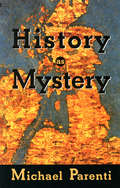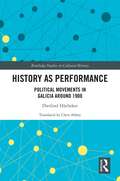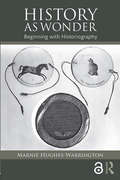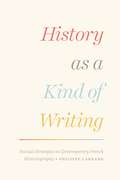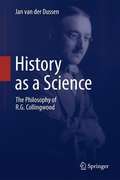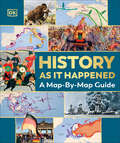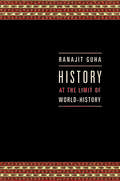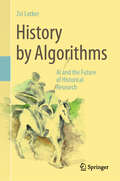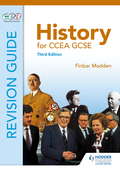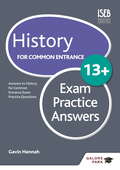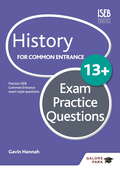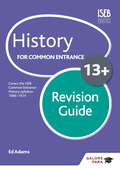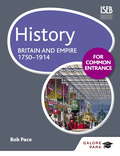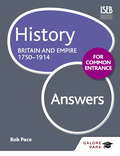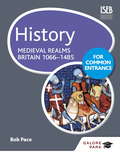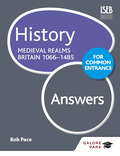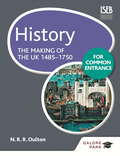- Table View
- List View
History as Mystery
by Michael ParentiEssays on how history's victors distort and suppress the documentary record in order to perpetuate their power and privilege, and how historians are influenced by the professional and class environment in which they work. "Michael Parenti, always provocative and eloquent, gives us a lively as well as valuable critique of orthodoxy posing as 'history. '"-Howard Zinn"Solid if surely controversial stuff. "- Kirkus Table of Contents Prologue: Against the Mainstream History as Miseducation Mainstream Orthodoxy The Hunt for Real History Textbooks: America the Beautiful For Business, Against Labor The School as a Tool Priests and Pagans, Saints and Slaves Triumph of the One True Faith Silencing the Pagans Accepting the Powers that Be Affluent Believers Saints For Slavery Bishops and Barbarians, Jezebels and Jews The Myth of the Devout Peasant The Curse of Eve The Burning of Books Preparing the Holocaust History in the Faking Suppression at the Point of OriginCold War in the Archives Classified History, USA Listening to the Muted Masses In Ranke's Footsteps His Majesty's Servant An Aristocratic Profession' Purging the Reds Publishing and Privishing' Marketing the Right Stuff The Strange Death of President Zachary Taylor, a Study in the Manufacture of Mainstream History Examining the Examination Confrontation with the Slavocracy A lethal Dose of Cherries and Milk? Honorable Men and Official History Against Psychopolitics Depoliticizing the Political Dubious Clinical Data Lenin as Oedipus The Compulsive Hoover The Political Hoover When the Political Becomes Personal Afterword
History as Performance: Political Movements in Galicia Around 1900 (Routledge Studies in Cultural History #93)
by Dietlind HüchtkerThis study analyzes history as performance: as the interaction of actors, plays, stages and enactments. By this, it examines women’s politics in Habsburg Galicia around 1900: a Polish woman active in the peasant movement, a Ukrainian feminist, and a Jewish Zionist. It shows how the movements constructed essentialistically regarded collectives, experience as a medially comprehensible form of credibility, and a historically based inevitability of change, and legitimized participation and intervention through social policy and educational practices. Traits shared by the movements included the claim to interpretive sovereignty, the ritualization of participation, and the establishment of truths about past and future.
History as Wonder: Beginning with Historiography
by Marnie Hughes-WarringtonHistory and Wonder is a refreshing new take on the idea of history that tracks the entanglement of history and philosophy over time through the key idea of wonder. From Ancient Greek histories and wonder works, to Islamic curiosities and Chinese strange histories, through to European historical cabinets of curiosity and on to histories that grapple with the horrors of the Holocaust, Marnie Hughes-Warrington unpacks the ways in which historians throughout the ages have tried to make sense of the world, and to change it. This book considers histories and historians across time and space, including the Ancient Greek historian Polybius, the medieval texts by historians such as Bede in England and Ibn Khaldun in Islamic Historiography, and the more recent works by Martin Heidegger, Luce Irigaray and Ranajit Guha among others. It explores the different ways in which historians have called upon wonder to cross boundaries between the past and the present, the universal and the particular, the old and the new, and the ordinary and the extraordinary. Promising to both delight and unsettle, it shows how wonder works as the beginning of historiography. Accessible, engaging and wide-ranging, History as Wonder provides an original addition to the field of historiography that is ideal for those both new to and familiar with the study of history.
History as a Kind of Writing: Textual Strategies in Contemporary French Historiography
by Philippe CarrardIn academia, the traditional role of the humanities is being questioned by the “posts”—postmodernism, poststructuralism, and postfeminism—which means that the project of writing history only grows more complex. In History as a Kind of Writing, scholar of French literature and culture Philippe Carrard speaks to this complexity by focusing the lens on the current state of French historiography. Carrard’s work here is expansive—examining the conventions historians draw on to produce their texts and casting light on views put forward by literary theorists, theorists of history, and historians themselves. Ranging from discussions of lengthy dissertations on 1960s social and economic history to a more contemporary focus on events, actors, memory, and culture, the book digs deep into the how of history. How do historians arrange their data into narratives? What strategies do they employ to justify the validity of their descriptions? Are actors given their own voice? Along the way, Carrard also readdresses questions fundamental to the field, including its necessary membership in the narrative genre, the presumed objectivity of historiographic writing, and the place of history as a science, distinct from the natural and theoretical sciences.
History as a Science
by Jan Van DussenSince its appearance in 1981 History as a Science has been welcomed as a coherent and comprehensive review and analysis of the many aspects of Collingwood's philosophy of history, the development of his views, and their reception. The book was the first to pay extensive attention to Collingwood's unpublished manuscripts, and to his work as an archaeologist and historian. With the publication of this volume Jan van der Dussen, opened up a new angle in Collingwood studies. The republication of this volume meets an increasing demand to make the book available for future Collingwood scholars, and people interested in Collingwood's philosophy. Apart from verbal changes to improve readability and a new pagination, the manuscript is the same as the original.
History as it Happened
by DKPore over more than 200 maps of the past to understand the world of the present in this children's history book with a difference.Watch the rise and fall of great empires and kingdoms, follow explorers of land and sea on their journeys of discovery, and learn how lucrative trade routes of spices and silk have all changed the way our world looks today.Hundreds of specially commissioned maps guide you through key moments in history, or show how things changed over time. Historical photographs help bring this history to life, while clear, bite-size text allows you to easily follow the story of humankind.History As It Happened breaks down history into simple, manageable chunks. Explore ancient Rome from its beginnings as a small kingdom, through the growth of its power as a republic, to its greatest glory as a continent-spanning empire. With this piece-by-piece approach to investigating history, and with its truly global and inclusive content, this is a children's history atlas like no other!
History at the Limit of World-History
by Ranajit GuhaThe past is not just, as has been famously said, another country with foreign customs: it is a contested and colonized terrain. Indigenous histories have been expropriated, eclipsed, sometimes even wholly eradicated, in the service of imperialist aims buttressed by a distinctly Western philosophy of history. Guha offers a critique of such historiography by taking issue with the Hegelian concept of World-history.
History at the Limit of World-History (Italian Academy Lectures)
by Ranajit GuhaThe past is not just, as has been famously said, another country with foreign customs: it is a contested and colonized terrain. Indigenous histories have been expropriated, eclipsed, sometimes even wholly eradicated, in the service of imperialist aims buttressed by a distinctly Western philosophy of history. Ranajit Guha, perhaps the most influential figure in postcolonial and subaltern studies at work today, offers a critique of such historiography by taking issue with the Hegelian concept of World-history. That concept, he contends, reduces the course of human history to the amoral record of states and empires, great men and clashing civilizations. It renders invisible the quotidian experience of ordinary people and casts off all that came before it into the nether-existence known as "Prehistory."On the Indian subcontinent, Guha believes, this Western way of looking at the past was so successfully insinuated by British colonization that few today can see clearly its ongoing and pernicious influence. He argues that to break out of this habit of mind and go beyond the Eurocentric and statist limit of World-history historians should learn from literature to make their narratives doubly inclusive: to extend them in scope not only to make room for the pasts of the so-called peoples without history but to address the historicality of everyday life as well. Only then, as Guha demonstrates through an examination of Rabindranath Tagore's critique of historiography, can we recapture a more fully human past of "experience and wonder."
History by Algorithms: AI and the Future of Historical Research
by Zvi LotkerThis book offers a first step towards getting machines to understand history in terms of analysing historical narratives. It uses computational intelligence and history texts as keys to ask different questions than have been asked about our human history so far. The book is divided into three main parts. The first part discusses the mathematical language of history, the second part uses simple models to analyse historical laws written in mathematical language, and the third part discusses the impact of general Large Language Models (LLMs) on the study of history.
History class 11 - GSTB - 23
by Gujarat State Board of School TextbooksThe book HISTORY STANDARD 11 of GSEB is a Gujarati-medium textbook that covers the history of India from the 16th to the 20th centuries. It discusses the major events and developments that took place during this period, including the rise and fall of the Mughal Empire, the Maratha challenge to the Mughals, the establishment of British rule in India, the growth of the Indian National Movement, and the attainment of independence in 1947. The book is written in a clear and concise style, and it is well-illustrated with maps, charts, and photographs. It is an essential resource for students of Indian history.
History class 11 - Meghalaya Board
by Prof. Shaukat Ullah KhanA book in History prescribed for use as a textbook in class XI by the Executive Chairman, Meghalaya Board of School Education, Tura, Meghalaya, vide Notification No. 15 dated Tura, the 28th March 2008.
History class 12 - GSTB
by Gujarat State Board of School TextbooksThe textbook for the 12th standard history course by the Gujarat State Board offers a comprehensive overview of India's modern history. It covers significant events and movements from the 18th to the 20th centuries, emphasizing the impact of European colonization and the Indian struggle for independence. The book explores the arrival of various European powers, their interactions with local economies, and the resulting socio-political changes. It highlights key figures and events in the Indian independence movement, illustrating the country's journey from colonial subjugation to sovereignty. The text is supported by archival materials and scholarly research, providing a detailed and factual representation of this period.
History for CCEA GCSE Revision Guide Third Edition
by Finbar MaddenThis revision guide provides both the key content you need to know for CCEA GCSE History and guidance on how to apply it. It is designed to consolidate knowledge and understanding of topics on the CCEA GCSE History specification and thoroughly prepare you for your exams. It covers the following four topics: - Germany 1918-39 - Peace, War and Neutrality: Britain, Northern Ireland and Ireland 1932-49 - Changing Relationships: Britain, Northern Ireland and Ireland 1965-85 - The Cold War 1945-91 It helps you to: - Revise the key course content by condensing topics into easy-to-revise chunks. - Understand the key concepts through targeted activities. - Remember what is required of you in the examination.
History for Common Entrance 13+ Exam Practice Answers
by Gavin HannahThis book contains answers to all questions featured in the accompanying title History for Common Entrance 13+ Exam Practice Questions. - Features worked examples of answers to the evidence and essay questions - Provides advice and guidance for achieving top marks - Includes ISEB Common Entrance mark scheme
History for Common Entrance 13+ Exam Practice Answers (for the June 2022 exams)
by Gavin HannahPlease note, this resource is suitable for the exams up to June 2022. New revision resources will be available from Spring 2022 for the exams from November 2022.Exam Board: ISEBLevel: 13+Subject: HistoryFirst Exam: Autumn 2013This book contains answers to all evidence questions featured in the accompanying title History for Common Entrance 13+ Exam Practice Questions.- Endorsed by ISEB- Features worked examples of answers to the evidence questions- Sample answers to 1 essay question are included for Levels 1, 2 and 3- Provides advice and guidance for achieving top marks - Includes ISEB Common Entrance mark schemeAlso available from Galore Park www.galorepark.co.uk:- History for Common Entrance 13+ Exam Practice Questions - History for Common Entrance 13+ Revision Guide
History for Common Entrance 13+ Exam Practice Questions
by Gavin HannahHistory for Common Entrance 13+ Exam Practice Questions features a wealth of exam-style questions based on the format of the new ISEB Common Entrance exam. Exam Practice Answers is available to accompany this title. - Features questions on all three historical periods tested at 13+ - Contains 30 evidence questions and 30 essay titles for varied practice - Familiarises pupils with the format of the questions to improve exam technique
History for Common Entrance 13+ Exam Practice Questions (for the June 2022 exams)
by Gavin HannahPlease note, this resource is suitable for the exams up to June 2022. New revision resources will be available from Spring 2022 for the exams from November 2022.Exam Board: ISEBLevel: 13+Subject: HistoryFirst Exam: Autumn 2013History for Common Entrance 13+ Exam Practice Questions features a wealth of exam-style questions based on the format of the new ISEB Common Entrance exam.- Endorsed by ISEB- Features questions on all three historical periods tested at 13+ - Contains 30 evidence questions and 30 essay titles for varied practice - Familiarises pupils with the format of the questions to improve exam techniqueAnswer book available separately. See History for Common Entrance 13+ Exam Practice AnswersAlso available from Galore Park www.galorepark.co.uk:- History for Common Entrance 13+ Exam Practice Answers- History for Common Entrance 13+ Revision Guide
History for Common Entrance 13+ Revision Guide
by Ed AdamsHistory for Common Entrance 13+ Revision Guide reflects the style and content of the new ISEB Common Entrance syllabus and provides essential support and guidance for thorough exam preparation. - Endorsed by ISEB - Consolidates all the key information required for Common Entrance - Provides tips and advice on how to answer both the evidence and essay questions - Includes 'Test yourself' exercises for focused revision Also available from Galore Park www.galorepark.co.uk: History for Common Entrance 13+ Exam Practice Questions History for Common Entrance 13+ Exam Practice Answers History for Common Entrance 13+ Revision Guide History for Common Entrance: Medieval Realms Britain 1066-1485 History for Common Entrance: The Making of the UK 1485-1750 History for Common Entrance: Britain and Empire 1750-1914
History for Common Entrance 13+ Revision Guide (for the June 2022 exams)
by Ed AdamsPlease note, this resource is suitable for the exams up to June 2022. New revision resources will be available from Spring 2022 for the exams from November 2022.Exam Board: ISEBLevel: 13+Subject: HistoryFirst Exam: Autumn 2013History for Common Entrance 13+ Revision Guide reflects the style and content of the new ISEB Common Entrance syllabus and provides essential support and guidance for thorough exam preparation.- Endorsed by ISEB - Consolidates all the key information required for Common Entrance- Provides tips and advice on how to answer both the evidence and essay questions- Includes 'Test yourself' exercises for focused revisionAlso available from Galore Park www.galorepark.co.uk:- History for Common Entrance 13+ Exam Practice Questions- History for Common Entrance 13+ Exam Practice Answers
History for Common Entrance: Britain and Empire 1750-1914
by Bob PaceHistory for Common Entrance: Britain and Empire 1750-1914 ensures a thorough understanding of the 'Britain and Empire' element of the Common Entrance exam syllabus. Clearly presented content, lively illustrations and challenging end-of-chapter questions encourage learning and inspire a love of History. - Endorsed by ISEB - Written by the chief exam setter for ISEB History Common Entrance - Arranged chronologically, to help pupils understand historical context - Includes source-based questions to develop essential exam skills Answer book available separately. See History for Common Entrance: Britain and Empire 1750-1914 Answers Also available from Galore Park www.galorepark.co.uk: History for Common Entrance 13+ Exam Practice Questions History for Common Entrance 13+ Exam Practice Answers History for Common Entrance 13+ Revision Guide History for Common Entrance: Medieval Realms Britain 1066-1485 History for Common Entrance: The Making of the UK 1485-1750 History for Common Entrance: Britain and Empire 1750-1914
History for Common Entrance: Britain and Empire 1750-1914 Answers
by Bob PaceThis book contains answers to all questions featured in the accompanying textbook History for Common Entrance: Britain and Empire 1750-1914, which ensures a thorough understanding of the 'Britain and Empire' element of the Common Entrance exam syllabus. - Endorsed by ISEB - Corresponds to chronological order of textbook - Features example answers for marking guidance - Includes ISEB Common Entrance mark scheme Also available from Galore Park www.galorepark.co.uk: History for Common Entrance 13+ Exam Practice Questions History for Common Entrance 13+ Exam Practice Answers History for Common Entrance 13+ Revision Guide History for Common Entrance: Medieval Realms Britain 1066-1485 History for Common Entrance: The Making of the UK 1485-1750 History for Common Entrance: Britain and Empire 1750-1914
History for Common Entrance: Medieval Realms Britain 1066-1485
by Bob PaceHistory for Common Entrance: Medieval Realms Britain 1066-1485 ensures a thorough understanding of the 'Medieval Realms' element of the Common Entrance exam syllabus. Clearly presented content, lively illustrations and challenging end-of-chapter questions encourage learning and inspire a love of History. - Endorsed by ISEB - Written by the chief exam setter for ISEB History Common Entrance - Arranged chronologically, to help pupils understand historical context - Includes source-based questions to develop essential exam skills Answer book available separately. See History for Common Entrance: Britain and Empire 1066-1485 Answers Also available from Galore Park www.galorepark.co.uk: History for Common Entrance 13+ Exam Practice Questions History for Common Entrance 13+ Exam Practice Answers History for Common Entrance 13+ Revision Guide History for Common Entrance: Medieval Realms Britain 1066-1485 History for Common Entrance: The Making of the UK 1485-1750 History for Common Entrance: Britain and Empire 1750-1914
History for Common Entrance: Medieval Realms Britain 1066-1485 Answers
by Bob PaceThis book contains answers to all questions featured in the accompanying textbook History for Common Entrance: Medieval Realms Britain 1066-1485, which ensures a thorough understanding of the 'Medieval Realms' element of the Common Entrance exam syllabus. - Endorsed by ISEB - Corresponds to chronological order of textbook - Features example answers for marking guidance - Includes ISEB Common Entrance mark scheme Also available from Galore Park www.galorepark.co.uk: History for Common Entrance 13+ Exam Practice Questions History for Common Entrance 13+ Exam Practice Answers History for Common Entrance 13+ Revision Guide History for Common Entrance: The Making of the UK 1485-1750 History for Common Entrance: Britain and Empire 1750-1914
History for Common Entrance: The Making of the UK 1485-1750
by Bob PaceHistory for Common Entrance: The Making of the UK 1485-1750 ensures a thorough understanding of the 'Making of the UK' element of the Common Entrance exam syllabus. Clearly presented content, lively illustrations and challenging end-of-chapter questions encourage learning and inspire a love of History. - Endorsed by ISEB - Written by the chief exam setter for ISEB History Common Entrance - Arranged chronologically, to help pupils understand historical context - Includes source-based questions to develop essential exam skills Answer book available separately. See History for Common Entrance: Britain and Empire 1485-1750 Answers Also available from Galore Park www.galorepark.co.uk: History for Common Entrance 13+ Exam Practice Questions History for Common Entrance 13+ Exam Practice Answers History for Common Entrance 13+ Revision Guide History for Common Entrance: Medieval Realms Britain 1066-1485 History for Common Entrance: Britain and Empire 1750-1914
History for Common Entrance: The Making of the UK 1485-1750 Answers
by Bob PaceThis book contains answers to all questions featured in the accompanying textbook History for Common Entrance: The Making of the UK 1485-1750, which ensures a thorough understanding of the 'Making of the UK' element of the Common Entrance exam syllabus. - Endorsed by ISEB - Corresponds to chronological order of textbook - Features example answers for marking guidance - Includes ISEB Common Entrance mark scheme Also available from Galore Park www.galorepark.co.uk: History for Common Entrance 13+ Exam Practice Questions History for Common Entrance 13+ Exam Practice Answers History for Common Entrance 13+ Revision Guide History for Common Entrance: Medieval Realms Britain 1066-1485 History for Common Entrance: The Making of the UK 1485-1750 History for Common Entrance: Britain and Empire 1750-1914
